Author Archives: Nicoletta Metri
Author Archives: Nicoletta Metri

A new Internet Society Chapter had been founded within the Regional Bureau in Latin America & Caribbean. The creation of the Internet Society Dominica Chapter was officially launched on January 11, at the Fort Young Hotel in Roseau City. The event was attended by 25 people, several key stakeholders from two major ISPs, as well as government representatives.
We would like to extend a warm welcome to all members and to the new Chapter executives (pictured above from left to right): Craig Nesty (President), Grayson Stedman Jr. (Vice President), Ishmael Joseph (Secretary), and Austin Lazarus (Treasurer).
 “The Chapter was founded by staff members of the National Telecommunications Regulatory Commission” says Melisha Toussaint, NTRC Assistant Engineer and Chapter member. “In recent times, the NTRC has updated its mandate not only to regulate the telecommunications industry in Dominica, but also to create an enabling environment for the growth and development of the Internet and ICTs.”
“The Chapter was founded by staff members of the National Telecommunications Regulatory Commission” says Melisha Toussaint, NTRC Assistant Engineer and Chapter member. “In recent times, the NTRC has updated its mandate not only to regulate the telecommunications industry in Dominica, but also to create an enabling environment for the growth and development of the Internet and ICTs.”
What are the key interests of the new Chapter?
One of the key goals is to support the Dominica government’s idea to create a climate resilient country following the passage of Hurricane Maria in 2017. The disaster helped realize the importance of communication post-disaster. In 2019, Continue reading

The Southeast Asia region is one of the fastest growing regions in the world today. With rich natural resources, it has evolved into a highly industrialized region, inviting investors from all over the world. The riches however, are not enjoyed by all. According to one ASEAN report, close to 36 million of its population are still living below the international poverty line, with 90% of these people in Indonesia or the Philippines.
Realizing that ASEAN’s greatest asset is its people, various initiatives have been carried out to promote community-driven activities and people-to-people interactions aimed at narrowing the income gap in the region. Today, it still remains relevant for ASEAN member states to partner with private organizations to identify and finance poverty eradication programs in order to realize the Sustainable Development Goals and ASEAN Vision 2025.
The Internet Society Malaysia Chapter, through the Beyond the Net Medium & Large Grant programme, and in collaboration with Malaysian’s Ministry of Women, Family and Community Development, the University Utara Malaysia, and the Council of Deans for ICT Eduction (Region IX) Philippines, aims to train 400 women in Malaysia and the Philippines to use the MyHelper crowdsourcing application so that they can Continue reading
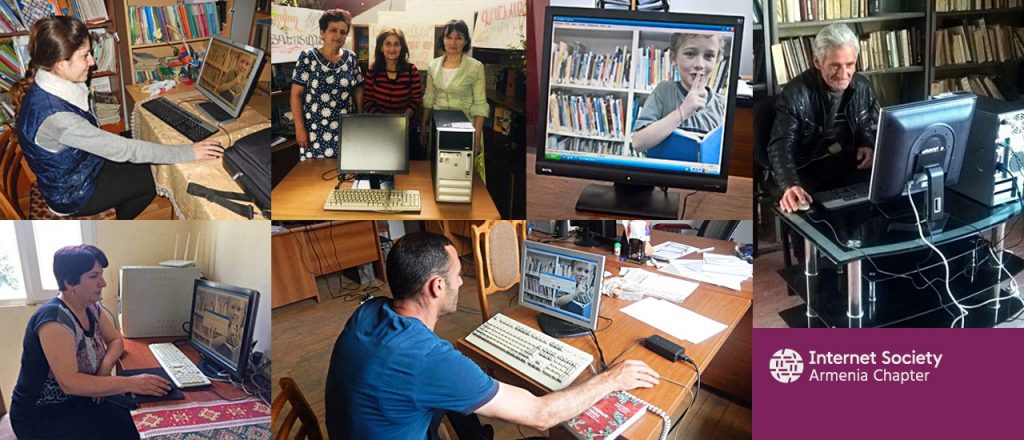
Although there are a large number of rural libraries in Armenia, the majority of them do not have computers or Internet access. Librarians are forced to deal with manual book circulation and lack of management programs. Residents are mostly unaware of the resources housed in the libraries. It became evident that libraries needed a technological shift to break from their current working routines and embrace change.
In 2015, The Internet Society Armenia Chapter started a pilot project to provide rural libraries with computers, software and training. The project team installed 20 computers with library management programs and estimated that, in order to cover all libraries, they needed to reach the number of about 1,000 computers.
In 2017, the Chapter started Computers, services and Wi-Fi Internet for rural libraries, a project supported by the Internet Society Beyond the Net Funding Programme, that aimed to install more computers to improve the librarians operation and provide lightweight library management programs as well as WiFi access for visitors. The project was presented at the national IGF on October 10, 2018.
 Igor Mkrtumyan, President of the Armenia Chapter, explains how their project is helping to address the needs of rural communities within the Continue reading
Igor Mkrtumyan, President of the Armenia Chapter, explains how their project is helping to address the needs of rural communities within the Continue reading

Kyrgyzstan’s transition to post-Soviet renovation toward a free market economy has had severe effects on the nation’s educational system. Having limited resources, schools in Kyrgyzstan desperately need more teachers. Currently, there are over 2500 teaching positions not being covered, most of them in the fields of natural science and mathematics.
Aiming to cover the need of affordable education, the Internet Society Kyrgyzstan Chapter developed Spring of Knowledge, a project supported by the Internet Society Beyond the Net Funding Programme, to provide new learning opportunities via digital self-study materials, such as offline access to Wikipedia, the Khan Academy online courses, as well as eBooks and video lessons in local languages.
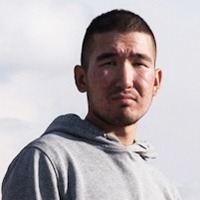
Isabek Asanbaev,
Project Manager
“The provision of textbooks in schools during the 2013-2014 academic year was only 73%.” explains the project manager Isabek Asanbaev. “The Kyrgyz Republic was ranked last in mathematics, science and reading among nations that participated in the 2006 and 2009 rounds of the Program for International Student Assessment (PISA). The National Sample-Based Achievement Test (NSBA) showed the same trend of underachievement. Our project aims to provide an opportunity for children to continue learning through self study in schools that don’t have enough teachers and Continue reading

The third edition of the India School on Internet Governance (inSIG) took place from 13–15 October 2018 at the India International Centre in New Delhi in partnership with the Internet Society Indian Chapters: Delhi, Trivandrum, Mumbai, and Kolkata. It was supported by the Beyond the Net Funding Programme with the participation of Olaf Kolkman, the Internet Society’s Chief Internet Technology Officer.
Ninety participants joined a three day activity event which included workshops, role play exercises and discussions. The event focused on educating emerging leaders from India and other South Asian countries, such as Afghanistan, Bangladesh, Nepal, and Sri Lanka on their role in the global Internet Governance ecosystem.
On 12 October 2018, two events were co-hosted: Firstly, The Internet Infrastructure Security Day, a workshop to learn more on pen Internet standards and sharing good practices as part of the Global Forum on Cyber Expertise (GFCE) – and secondly, India’s first Youth Internet Governance Forum (YIGF), which conducted multiple sessions on topics of relevance to young Internet users, particularly those in secondary school, college, and early employment. Both events were live streamed and viewed by over 1,500 participants.

A range of several industry experts offered insight into India’s Continue reading

The Pakistan School on Internet Governance 2018 (pkSIG) took place at the Regent Plaza Hotel in Karachi from 3-6 September 2018. It offered a four day intensive learning course, covering the political, legal, economic, socio-cultural, and technological dimensions of Internet Governance within the context of the Pakistani national imperatives. The program included theoretical sessions, role play, and participant engagement activities.
One of the objectives of the seminar was to develop a shared understanding of youth participation in Internet Governance by building expertise through the alumni of the school. A fellowship opportunity was offered to young applicants from the Sindh and Baluchistan provinces who presented a strong motivation to continue to work locally on IG issues after the pkSIG.
The involvement of students and young professionals, like the ICT engineer Sohaib Bukhari, is a successful example of meaningful participation in the shaping of the Internet. They are the generation that has been using the Internet since they were children, they are the ones who will be using it for the next 50 years. Sohaib was thrilled to have an open dialogue with the key stakeholders, while gaining access to comprehensive and structured knowledge on various aspects of the Internet Governance.
So, Continue reading
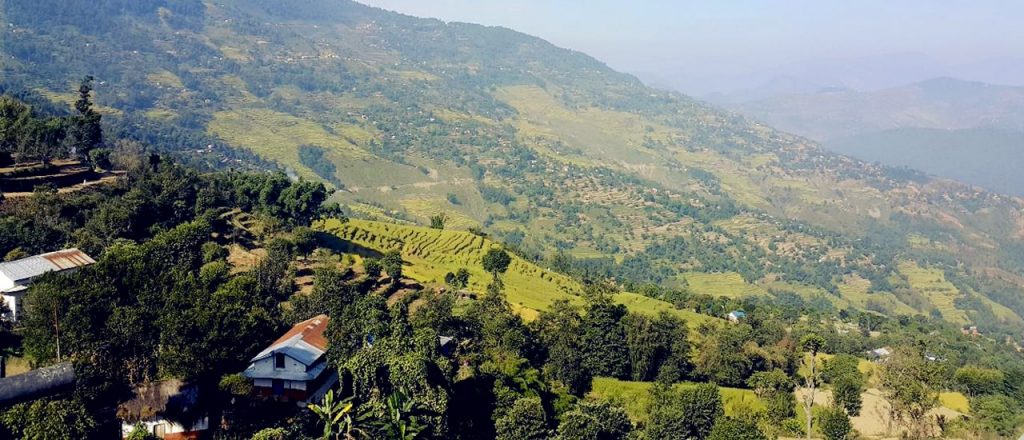
Lack of an affordable and accessible community healthcare is a challenge in rural communities across the globe, and an obstacle in ensuring a healthy population in remote indigenous communities across rural Nepal. Broadband connectivity is opening the door to more accessible and cost-effective patient care by speeding up electronic health records and digital images and increasing mobility with wireless monitoring devices.
This story takes place in Dullu, a place extremely difficult to reach, located in the Dailekh District in mid-western Nepal. In order to reach the area, you need to fly from Kathmandu to Surkhet via a domestic flight and then take an off-road, four-wheel drive across approximately 80 kilometers, many of which are through a mountainous dirt road that remains challenging for both visitors and locals. Despite being fertile land filled with culture and history, Dullu is far behind in the development process and it is still struggling in terms of infrastructure development, including road access, robust communication, and proper health and education services.
The town’s solitary hospital is perpetually understaffed. Budget cuts, inhospitable winters, and lack of medical resources have perennially plagued medical service deliveries to the approximately 45,000 residents who depend on a distant health center.
The Continue reading
Research carried out primarily in North America and Europe shows that the most severe forms of online harassment are especially affecting women and girls. While anecdotal evidence suggests this is also true in Barbados, there is no available research to highlight the prevalence of online abuse against Barbadian women. Though legislation against online abuse exists in Barbados, few cases have been heard in court, and victims perceive the response of law enforcement to be inadequate.
The Internet Society Barbados Chapter, supported by Beyond the Net Funding Programme, has taken a major step towards ensuring online abuse awareness in their community through the project C.A.R.E – Combating (online) Abuse through Research and Education. The initiative, being hailed as the first of its kind in Barbados, will conduct an awareness campaign about the effects of online abuse on women and girls and create a dialog between law enforcement and victims.
 “The project is managed by registered charity No! to Online Abuse and Harassment (NOAH) and all team members are members of the ISOC Barbados Chapter,” explains Ashell Forde, project manager and President of NOAH.
“The project is managed by registered charity No! to Online Abuse and Harassment (NOAH) and all team members are members of the ISOC Barbados Chapter,” explains Ashell Forde, project manager and President of NOAH.
“There is a clear need for stronger strategies to help women Continue reading
Current researches show that children are exposed to both increased risks and increased opportunities when accessing the Internet and using apps and social media. The UNICEF’s “Children in a Digital World” 2017 report takes a comprehensive look at the different ways digital technology affects children. It is critical that children have necessary training in digital literacy to acquire the skills to minimize risks and to confidently navigate the web to maximize their opportunities. Evidence suggests that technology has benefits where positive human forces for learning are already in place.
The University of the Republic in partnership with the Internet Society Uruguay Chapter and the financial support of the Beyond the Net Funding Programme has taken significant steps to help children and teenagers to develop digital skills in a creative and innovative way in three of the nineteen segments in which Uruguay is politically divided, Paysandú, Rivera, and Salto. Their project Flor de Ceibo Conecta2 aims to train young people from disadvantaged communities using digital resources in creative and challenging learning classes to help them improve their everyday lives and expand their chances for a better future.
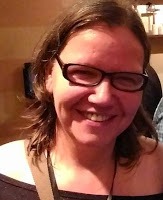 María Julia Morales González, project manager and professor at the Department of Sociology and Continue reading
María Julia Morales González, project manager and professor at the Department of Sociology and Continue reading
Although coding has yet to be upgraded from an extracurricular activity, a growing number of countries are introducing programming as part of the school syllabus. Coding is considered a new literacy that is becoming more-and-more important as technology innovation is impacting every field of human knowledge. Educators have a key role in teaching primary school children to be passionate about computer science and stimulating their imagination and spirit of competition to solve problems. Learning how to code starting in elementary school helps pupils acquire skills that will be relevant in tomorrow’s labour market and get the highest-paying entry level jobs as they become college graduates.
Motivated by a successful programming course held in 2017, the Internet Society Montenegro Chapter decided to organize a CodeWeek Java Programming and applied for the Beyond the Net Funding Programme Chapter Small Projects, an initiative intended to assist Internet Society Chapters with financial support to fund small projects such as events, learning opportunities, skill development, and networking with local entities.
“This was more than great. I had fun in every sense of that word. I would recommend this course to every friend. Can’t wait till next year!”
“I like this way of studying. Continue reading
Only 1 in 10 Wikipedia editors is a woman. Unfortunately, the underrepresentation of female perspectives is quite common within the tech world. In order to help achieve gender equality in content creation and dissemination, Wikipedia Editathons are held as a way of bridging the gap and encourage female editors to increase the coverage of women’s topics.
The Internet Society India Delhi Chapter, in partnership with the Women Special Interest Group and supported by the Wikimedia Foundation, organized the 1st Global Editathon “Girls in ICT” on 28 April, 2018. Various Chapters and groups participated in this event to increase Wikipedia pages about Asian women who have contributed to any technology-related fields.
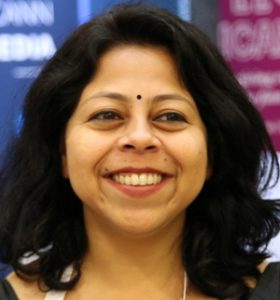 “Women are seriously underrepresented in Wikipedia’s content,” says Amrita Choudhury, treasurer of the Internet Society India Delhi Chapter. She has over 17 years of experience in IT and the Internet industry and is a member of the SIG Women team. “Exact figures vary depending on which research you’re reading, but only around 17% of individuals profiled on Wikipedia are women.”
“Women are seriously underrepresented in Wikipedia’s content,” says Amrita Choudhury, treasurer of the Internet Society India Delhi Chapter. She has over 17 years of experience in IT and the Internet industry and is a member of the SIG Women team. “Exact figures vary depending on which research you’re reading, but only around 17% of individuals profiled on Wikipedia are women.”
What Chapters were involved and how did you work together?
“As devoted to the #ShineTheLight movement, we decided to collaborate with the SIG Women, whose main interest Continue reading
Currently, 53% of the world’s population is offline due to factors such as high cost of Internet infrastructure and lack of relevant local content. Internet access remains unaffordable in many economies in transition where people have to choose between the Internet and other vital necessities such as food and health. Maybe one day we will look back at this historic moment in which Community Networks were paving the way for equitable and meaningful access to technology.
Community Networks are an emerging complementary and sustainable solution to address the connectivity gap existing in underserved urban and rural areas around the world. Such networks rely on the active participation of local communities in the development and management of shared Internet infrastructure as a common resource. Existing examples provide concrete evidence that community network development can prompt positive effects to help communities leverage on technology for socioeconomic empowerment. We have gained experience from Guifi.Net, Zenzeleni Network, Rhizomatica and Wireless For Communities, all successful projects proving that the technical side of the community network model can be replicated.
 I asked Josephine Miliza a few questions to get deeper insight into the project. Josephine is a network engineer with a Continue reading
I asked Josephine Miliza a few questions to get deeper insight into the project. Josephine is a network engineer with a Continue reading
The food sector is one of the few large remaining sectors that have not been radically transformed by new technologies yet. Up to now, the Internet in particular was not involved as much as other sectors. However, in a not-too-distant future, the everyday question “what’s for dinner?” will be answered by algorithms managed by the next generation of food companies. When these algorithms are governing the food industry, they will also be governing people as well as their health and well-being.
As food is online, we will start realizing how important network design has become for our existence. The question “what’s for dinner?” will be replaced by “who decides what we eat?”. The Internet Society members, Johan Jörgensen, Michael Daun and Patrik Fältström, assure that this is the most profound question that the tech revolution has asked so far. That is the reason why they created a Special Interest Group on Internet of Food to focus on general discussions around the future infrastructure and standards for the digital world of food.
 The project leader Johan Jörgensen explains: “The initial work in the SIG has been about discussing which standards already exist in the food Continue reading
The project leader Johan Jörgensen explains: “The initial work in the SIG has been about discussing which standards already exist in the food Continue reading
Cyber-bullying is a growing phenomenon amongst preteens. Studies have established that nearly 43% of children are victims of cyberbullying and girls are twice as likely to be targeted. Students who experienced cyber attacks suffer drops in school grades and have more suicidal thoughts than those who had never dealt with such forms of peer aggression. A link between cyber harassment victimization and noncompletion of school has been demonstrated resulting in increased risk of poor education and substance abuse in adulthood.
Sadly, the majority of the victims do not report the incidents to adults or authorities due to fear of negative effects and social scandal. The tacit support given to the bullying perpetrators through silence contributes to the escalation of victimization. Banning technology is not the answer. Cyberbullying prevention in schools is crucial to defend students from this new face of violence.
The Internet Society Palestine Chapter is conducting a campaign to raise awareness about the dangers of electronic blackmail and cyber harassment. The project, funded by the Internet Society Beyond the Net, has already reached more than 2250 schoolgirls in 25 Palestinian schools in phase I of the project.
 Ahmad Alsadeh, assistant professor at Birzeit University and Continue reading
Ahmad Alsadeh, assistant professor at Birzeit University and Continue reading
In January 2018, the Internet Society Nepal Chapter organized the first Nepal School on Internet Governance (npSIG) in collaboration with the Forum for Digital Equality. The initiative offered an intensive two-day learning course covering a wide list of topics at the Institute of Engineering Pulchowk in Kathmandu. The initiative helped participants to identify global and regional issues and facilitate the understanding of several aspects of Internet Governance, including access, diversity, security, privacy, IoT, and human rights within the Nepalese policy framework. The schedule included theoretical sessions, roleplays, and attendee engagement activities. All brilliant speakers presentations are available on sig.org.np for further consultation.
One of the major objectives of npSIG was to raise awareness among young people about Internet Governance issues and to promote their participation in the discussion. The speakers inspired analysis, critical thinking and motivated the audience to design effective questions and take action.
The opening speech delivered by Baburam Aryal, Chairperson at the Forum for Digital Equality, enhanced the understanding of the Internet Governance concept, which in Nepal is in the very early stages of development. The establishment of a proper ecosystem is complex as Continue reading
 Jacqueline is attending S4 secondary school HVP Gatagara. She used to read well, but when she reached primary five she went blind and started using audios.
Jacqueline is attending S4 secondary school HVP Gatagara. She used to read well, but when she reached primary five she went blind and started using audios.
“Studying with audios was challenging” she explains. “Sometimes I got bored and fell asleep. As time went by, I got experienced and I was able to pass my national examination regardless of my blindness.”
A project led by The Internet Society Rwanda Chapter and supported by Beyond the Net Funding Programme is implementing a breakthrough solution that will impact Rwanda’s education sector, addressing the urgent need of a functional learning environment for the visually impaired students.Visual impaired people are not aware of benefits they can get from the Internet. Awareness of what is possible and what is already available is crucial especially for blind students. Young Jacqueline believes that big things have small beginnings and that the Internet will give all students a better opportunity for a successful education: “We have a lot of books here, but we can’t take them home as others do. My request is to turn these books into audios and make them accessible to allow me and my classmates to keep on studying.”
Half of the world’s languages are expected to disappear by the end of the century. This is a huge cultural loss to humanity. When we think about endangered languages, we usually consider them as part of traditions that link us to the past. From a forward-looking perspective, they mean more than cultural heritage. When a language dies, a unique vision of the world is gone forever.
Does the language we speak online matter? Studies show that it deeply affects people’s experience of the Internet. It determines how much information we can access, who we choose to connect with and how we behave in our community. Keeping languages alive is essential to shape our future. The Internet offers the greatest chance to have a public voice in response to cultural globalization, a languages renaissance.
UNESCO is convinced that multilingualism on the Internet has a key role to play in fostering pluralistic, open and inclusive knowledge societies.
A project called Siminchikkunarayku, supported by The Internet Society Peru Chapter and the Beyond the Net Funding Programme, aims to build the linguistic corpus of the southern Quechua language by collecting and digitizing 10,000 hours of speeches. The Quechua is a family Continue reading
As economies develop in Tanzania, rural residents have growing needs for communication and broadband access. However, mobile operators are reluctant to invest in remote areas due to the elevated infrastructure cost and the high percentage of people that can’t afford the payment of the services.
The Internet Society Tanzania Chapter, supported by Beyond the Net Funding Programme in partnership with The University of Dodoma will target the remote areas of Dodoma Region, where conventional deployments are not available. Together, they will build a pilot project using TV White Space equipment as a community network solution.
White Space Internet is not widely adopted so far, but has the potential to transform the way we use wireless Internet. Being a free form of broadband, it is as a good alternative to provide underserved communities with Internet access that is similar to that of 4G mobile. White Space power stations can be charged with solar panels and broadband can travel up to 10 kilometers through vegetation, buildings and other obstacles.

“It’s amazing how life has changed in Tanzania thanks to the Internet”, explains Jabhera Matogoro, project manager and coordinator of Microsoft Innovation Center at the University of Continue reading
The Internet has the potential to enable Indigenous communities to continue living on remote traditional lands without diminishing their access to services and information. The potential can go a long way towards closing the digital divide and offers new opportunities while preserving Indigenous culture.
In the ongoing debate about what difference the digital makes to the concept of Indigeneity itself, the voices of Indigenous people are what has been missing. It should be left up to community members to be caught up in this age of information and build the future on their own terms.
This is the story of Lenca people of Azacualpa, an Indigenous community of Yamaranguila in Intibucá, Honduras. In June 2017 they decided to start their relationship with technology by creating Radio Azacualpa, a radio station run by women, with the support of Cultural Survival’s Community Media Grants Project. It was a dream come true.
The radio tagline “La voz de las Mujeres” – the voice of women – says it all. “One of our goals as a radio station is to achieve recognition of our rights as women and to achieve equality,” explains Maria Santos, leader of the Azacualpa community.
In 2018, the Lenca decided Continue reading
As players in the development of the Internet in the world, the academic and scientific communities of the five continents have made important efforts to establish National Research and Education Networks (NRENs) to interconnect universities and research centers to exchange information at a regional level. Examples of these networks are GÉANT in Europe, Internet 2 in the United States, and RedCLARA (Latin American Cooperation of Advanced Networks) in the Latin American region.
The Bolivian academic sector is made up of more than 60 universities with half a million students and 20,000 teachers. Unfortunately Bolivia is the only country that is not connected to RedCLARA. Bolivia not only lacks connection with any NREN, but also has not managed to constitute its own National Academic Scientific Network. Since 2002, several attempts have been made, involving more than 30 universities in the country. As a result, the statutes and regulations of the Bolivian Integration Academic Network (RIAB) have been drafted.
The project Red Academica Boliviana, led by the Internet Society Bolivia Chapter and supported by Beyond the Net Funding Programme, has a long-term goal: to lay the foundations that will strengthen the development of research and education in Bolivia through the Continue reading